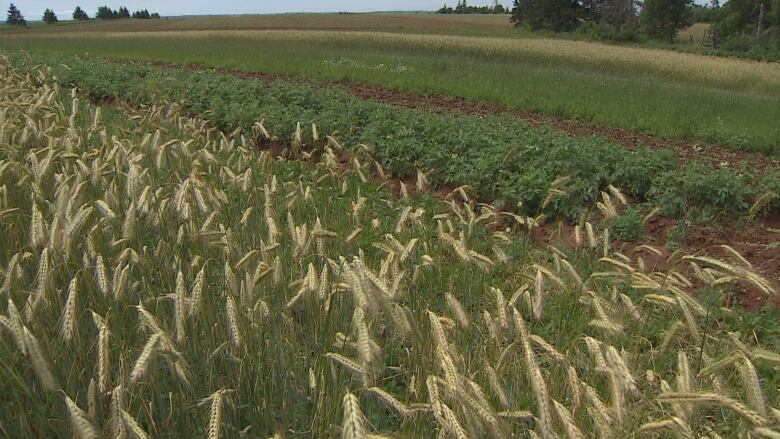P.E.I. farmers try new ways of improving soil quality
'It does require a whole lot of learning, making mistakes and trying to do that without losing the farm'

A P.E.I. farm family is changing the way they manage their soil in an effort to improve the quality of the soil — and their crops.
John Ramsay and his three sons grow over 200 hectares (500 acres) of processing potatoes as well as grains, organic peas and hemp on Oyster Cove Farms in Hamilton, near Indian River.
"Our soil, it's non-replaceable and every time the wind blows or the water flows across the field, if it's not protected it eventually erodes away," he said.
"It's been happening for decades, we need to reduce that as much as possible."
Prevent erosion
Over the last few years, the Ramsays have tried to reduce how much they till their soil and use a technique called residue tillage that makes the soil less vulnerable to erosion.
"It incorporates the residue and leaves it on the surface which helps catch snow in the winter and helps prevent erosion," John said.

They also plant cover crops that hold the soil in place over the winter, mainly fall rye and this year, mustard.
"We really saw it last winter, we had a lot of our fields with cover crops on it and we had a lot of freeze and thaws and a lot of wind," he said.
"These cover crops mitigate that erosion pretty much to zero."

Active soil
John says the goal is to leave as little exposed soil as possible, and there's an additional benefit as well to the cover crops.
"Anything that's growing in the soil is providing microbial activity for the soil so we feel it's actually giving the soil something to do instead of sitting there and doing nothing," he said.
The Ramsays have also changed their crop rotation, adding crops like buckwheat, mustard and sudangrass to make the soil healthier.

"Diversity has been the central key, we've been trying to put more different species and varieties into the soil to break up pest cycles, to try to feed the soil as if it's livestock," said Matt Ramsay.
"Looking at protein and carbon and nitrogen and things like that and trying to increase the metabolic activities of our soils."
- Why P.E.I. potato farmers are planting more mustard than ever
- P.E.I. scientists see growing potential for sorghum sudangrass
The Ramsays are also part of a number of on-farm research projects with the Potato Board, Agriculture Canada and the P.E.I. Department of Agriculture.
"I think that's what we're learning is that there's this whole biological dimension to the soil that we can manage that is related to higher productivity," Matt said.
"Whole lot of learning'
They even have their own "test plot" on the farm where they try out new crops and planting techniques.
"It does require investment and a whole lot of learning and making mistakes and trying to do that without losing the farm," Matt said.
"It's very long term, it takes a lot of work over a lot of time."

The P.E.I. Potato Board says more and more Island farmers are, like the Ramsays, putting the focus on soil health.
"Growers are embracing new technologies, new production practices to make building soil health a priority," said Ryan Barrett, research and agronomy co-ordinator of the Potato Board.
"It's not just changing one thing, it's a suite of things that all help."

